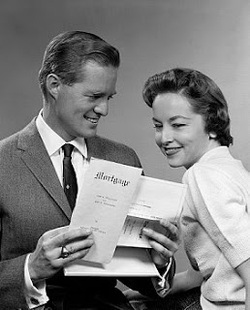 My husband and I lived together for about a year before we got married. We were looking for a home and decided on one just before our wedding ceremony. To make sure the loan went through, we applied through my husband's credit (which was excellent- mine was not good due to a recent bankruptcy). He got the loan and we financed 100% of the payments. My husband signed an earnest money contract and we went off to our wedding. When we got back, we closed on the house and I co-signed all the paperwork as the wife. Thereafter, we made all the loan payments from our joint account. Now that we are divorcing, my husband claims that the house is his separate property and the court cannot award it to me in the divorce. Is he right? As odd as it may sound, and as unfair as it may seem, your husband is probably right. All property that is possessed during a marriage is presumed by the courts to be community property and subject to division by the courts. However, this presumption can be rebutted if a party can show that the property was acquired before the marriage. The result is what is called the "Inception of Title" rule, which basically says if you can prove the property became the legal ownership of one party before the marriage, it is considered that party's separate property and cannot be taken from him or her in the divorce. Normally ownership begins in the moment when you obtained legal title to the property, but oddly, not in the case of real estate. For real estate, the court traces the characterization back to the earnest money contract. This was the holding in Wierzchula v. Wierzchula, a 1981 case. However, there are several factors here which should give you some solace: 1. It is your husband's burden to overcome the community property presumption. For example, if he can't produce the earnest money contract in court, the judge may declare the property community anyway. 2. Just because the property is characterized as your husband's separate property doesn't mean you loose out on all the mortgage payments that were made from your joint account. You will still have an equitable reimbursement claim on all that money- which the court may award you. You may not get the house itself, but you can get back a lot of the value of it. Make sure that your pleadings ask for this. 3. The Wierzchula case mentions the fact that the house in question was the homestead of the parties, that is, they were living in it. If your house was not a homestead but instead was, or at some point became, a rental or other investment property, you may be entitled to the income generated from that property. The general rule is that rents collected during a marriage, even if from one party's separate property are considered community property. (McElwee v. McElwee, 1995). So the bottom line is that although your husband can't lose title to the house, under your circumstances, the court is free to reimburse back to the community estate the mortgage payments made on the house, and also any income generated from the house as it deems fair and right. I would also suggest that if you can prove that the house has appreciated in value significantly over the time of the marriage, then you may also be able to convince the court that the appreciation is also community property, subject to right and proper division. However, you would have to investigate this further because in today's depressed real estate market such appreciation is no longer an assured fact.
0 Comments
Leave a Reply. |
Need more information about this or other family law topics in Texas?
Click the button below to book a FREE ATTORNEY CONSULTATION (832) 819-3529
Attorney Sean Y. Palmer has over 20 years of legal experience as a Texas Attorney and over 25 years as a Qualified Mediator in civil, family and CPS cases. Palmer practices exclusively in the area Family Law and handles Divorce, Child Custody, Child Support, Adoptions, and other Family Law Litigation cases. He represents clients throughout the greater Houston Galveston area, including: Clear Lake, NASA, Webster, Friendswood, Seabrook, League City, Galveston, Texas City, Dickinson, La Porte, La Marque, Clear Lake Shores, Bacliff, Kemah, Pasadena, Baytown, Deer Park, Harris County, and Galveston County, Texas.
Call (832) 819-3529 If you live in the Houston area and would like to consult with one of our attorneys, please leave your information below.Archives
July 2024
Categories
All
|
The Palmer Law Firmwww.thepalmerlawfirm.com
(c) 2024 Sean Y. Palmer |
DISCLAIMER:
This website is for educational and informational purposes only and is not, nor is it intended to be, legal advice. Viewing of this website does not create an attorney-client relationship. All legal matters should be discussed with a licensed attorney before you take any action. You should consult with an attorney for advice for your individual situation. Sean Y. Palmer is the attorney responsible for the content of this site. DATA NOTIFICATION: Pursuant to the Health Insurance Portability and Accountability Act, and the Texas Medical Records Privacy Act of the Texas Health and Safety Code, consumers are noticed that their protected healthcare information may be transmitted electronically. |


 RSS Feed
RSS Feed